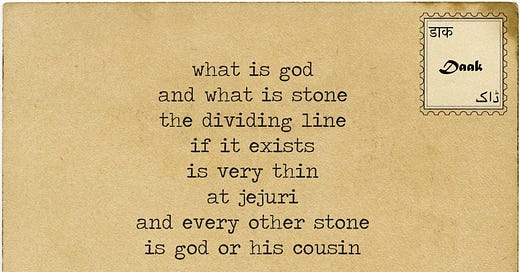Looking for a God: Reading Arun Kolatkar’s Poem, Jejuri
Arun Kolatkar (1932-2004) only came to be known as the famous poet he is, later in life. He wrote privately, in both Marathi and English, and worked as a graphic designer – a visualiser – in the advertising industry. The New Yorker carried a brief about his poem, Jejuri, in 2006, almost thirty years after it was first published, noting that Kolatkar’s experience as a musician and artist explained “the acuteness of his ear and eye”. It is these sharp observations that Kolatkar intersperses with his own meditations in the poem that make the reader want to return to it, over and over again.
All accounts from those who knew him mention his table at the Wayside Inn in Kala Ghoda in Bombay, from where he would look out into the street and observe – his poetry memorialising those he saw – often not the people one would find as characters in poetry. He also made liberal use of their tongues – his Marathi poetry loaded not just with expletives but also with the mixture of Hindi-Marathi street speak.
मै भाभीको बोला
क्या भाईसाबके ड्यूटीपे मै आ जाऊ ?
भड़क गयी साली
रहमान बोला गोली चलाऊँगा
मै बोला एक रंडीके वास्ते?
चलाव गोली गांडू
allow me beautiful
i said to my sister in law
to step in my brother's booties
you had it coming said rehman
a gun in his hand
shoot me punk
kill your brother i said
for a bloody cunt
Described by Amit Chaudhari as “a mixture of unassumingness, reticence, mischief and recalcitration”, Kolatkar’s work, Jejuri, can be read with the same descriptors. Much celebrated and often thought to be one of the best-known works of English poetry in India, Jejuri is a series of 31 short poems about the poet’s visit to a small temple town in Maharashtra. It details the journey beginning from the bus ride to the town, a day spent visiting various temples and at the end, a desperation to leave in peace. But at all moments, the poet comes face to face with the various aspects of religion as a business and ritual as transaction.
what is god
and what is stone
the dividing line
if it exists
is very thin
at jejuri
and every other stone
is god or his cousin(…)
scratch a rock
and a legend springs
It isn’t that the poet himself goes in with great devotion, but is met with shock – his subjectivity is clear throughout.
Take my shirt off
and go in there to do puja ?
No thanks.
Not me.
But you go right ahead
if that's what you want to do.
Give me the matchbox
before you go,
will you ?
I will be out in the courtyard
where no one will mind it
if I smoke.
Yet, what is interesting is his critique of the powerholders in religion: the hypocrisy of the Brahmins, commercialisation of pilgrimage, and the absurdity of ritual. Towards the end when the poet wants to leave, he writes that to get someone to tell him the timing of the next train he would need to,
slaughter a goat before the clock
smash a coconut on the railway track
smear the indicator with the blood of a cock
bathe the station master in milk
One of his longer poems, “Yeshwant Rao”, is what we have picked today – a critique of religion as we see it on display and of the power held by those that control it. In the style and voice of those that peddle religion as a commodity, Kolatkar wrote this as a part of Jejuri.
Yeshwant Rao
Are you looking for a god?
I know a good one.
His name is Yeshwant Rao
and he's one of the best.
Look him up
when you are in Jejuri next.
Of course he's only a second class god
and his place is just outside the main temple.
Outside even of the outer wall.
As if he belonged
among the tradesmen and the lepers.
I've known gods
prettier faced
or straighter laced.
Gods who soak you for your gold.
Gods who soak you for your soul.
Gods who make you walk
on a bed of burning coal.
Gods who put a child inside your wife.
Or a knife inside your enemy.
Gods who tell you how to live your life,
double your money
or triple your land holdings.
Gods who can barely suppress a smile
as you crawl a mile for them.
Gods who will see you drown
if you won't buy them a new crown.
And although I'm sure they're all to be praised,
they're either too symmetrical
or too theatrical for my taste.
(…)Yeshwant Rao
Does nothing spectacular.
He doesn't promise you the earth
Or book your seat on the next rocket to heaven.
But if any bones are broken,
you know he'll mend them.
He'll make you whole in your body
and hope your spirit will look after itself.
He is merely a kind of a bone-setter.
The only thing is,
as he himself has no heads, hands and feet,
he happens to understand you a little better.
Much of Kolatkar’s work is available online but this particular edition of Jejuri with an introduction by Amit Chaudhri is a beautiful read and treasure trove of insight.



